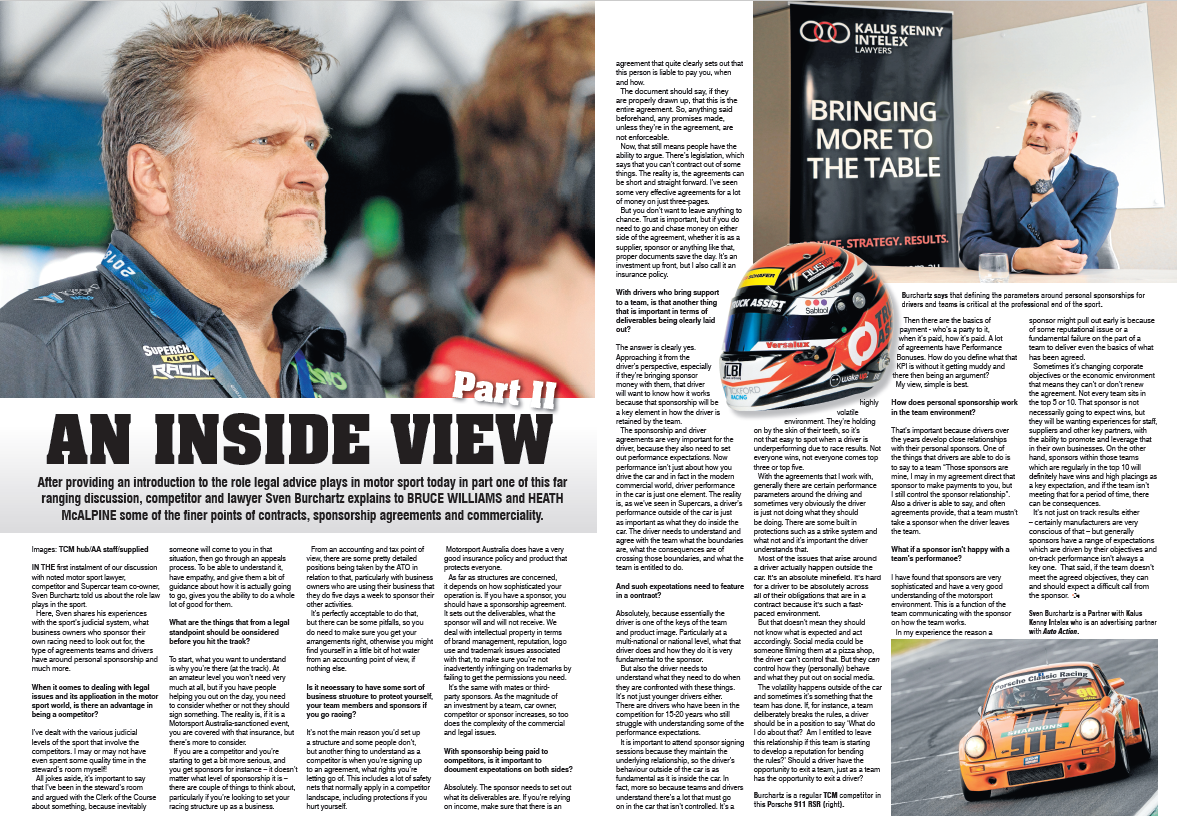As published in Auto Action magazine, edition 1787, 5 June 2020, pages 40-41.
After providing an introduction to the role that legal advice plays in motor sport today in part one of this far ranging discussion, competitor and lawyer Sven Burchartz explains to Bruce Williams and Heath McAlpine some of the finer points of contracts, sponsorship agreements and commerciality.
In the first instalment of our discussion with noted motor sport lawyer, competitor and Supercar team co-owner, Sven Burchartz told us about the role law plays in the sport.
Here, Sven shares his experiences with the sport’s judicial system, what business owners who sponsor their own racing need to look out for, the type of agreements teams and drivers have around personal sponsorship and much more.
When it comes to dealing with legal issues and its application in the motor sport world, is there an advantage in being a competitor?
I’ve dealt with the various judicial levels of the sport that involve the competitors. I may or may not have even spent some quality time in the steward’s room myself!
All jokes aside, it’s important to say that I’ve been in the steward’s room and argued with the Clerk of the Course about something, because inevitably someone will come to you in that situation, then go through an appeals process. To be able to understand it, have empathy, and give them a bit of guidance about how it is actually going to go, gives you the ability to do a whole lot of good for them.
What are the things that from a legal standpoint should be considered before you hit the track?
To start, what you want to understand is why you’re there (at the track). At an amateur level you won’t need very much at all, but if you have people helping you out on the day, you need to consider whether or not they should sign something. The reality is, if it is a Motorsport Australia-sanctioned event, you are covered with that insurance, but there’s more to consider.
If you are a competitor and you’re starting to get a bit more serious, and you get sponsors for instance – it doesn’t matter what level of sponsorship it is – there are a couple of things to think about, particularly if you’re looking to set your racing structure up as a business.
From an accounting and tax point of view, there are some pretty detailed positions being taken by the ATO in relation to that, particularly with business owners who are using their business that they do five days a week to sponsor their other activities.
It’s perfectly acceptable to do that, but there can be some pitfalls, so you do need to make sure you get your arrangements right, otherwise you might find yourself in a little bit of hot water from an accounting point of view, if nothing else.
Is it necessary to have some sort of business structure to protect yourself, your team members and sponsors if you go racing?
It’s not the main reason you’d set up a structure and some people don’t, but another thing to understand as a competitor is when you’re signing up to an agreement, what rights you’re letting go of. This includes a lot of safety nets that normally apply in a competitor landscape, including protections if you hurt yourself.
Motorsport Australia does have a very good insurance policy and product that protects everyone.
As far as structures are concerned, it depends on how sophisticated your operation is. If you have a sponsor, you should have a sponsorship agreement. It sets out the deliverables, what the sponsor will and will not receive. We deal with intellectual property in terms of brand management, reputation, logo use and trademark issues associated with that, to make sure you’re not inadvertently infringing on trademarks by failing to get the permissions you need.
It’s the same with mates or third-party sponsors. As the magnitude of an investment by a team, car owner, competitor or sponsor increases, so too does the complexity of the commercial and legal issues.
With sponsorship being paid to competitors, is it important to document expectations on both sides?
Absolutely. The sponsor needs to set out what its deliverables are. If you’re relying on income, make sure that there is an agreement that quite clearly sets out that this person is liable to pay you, when and how.
The document should say, if they are properly drawn up, that this is the entire agreement. So, anything said beforehand, any promises made, unless they’re in the agreement, are not enforceable.
Now, that still means people have the ability to argue. There’s legislation which says that you can’t contract out of some things. The reality is, the agreements can be short and straight forward. I’ve seen some very effective agreements for a lot of money on just three-pages.
But you don’t want to leave anything to chance. Trust is important, but if you do need to go and chase money on either side of the agreement, whether it is as a supplier, sponsor or anything like that, proper documents save the day. It’s an investment up front, but I also call it an insurance policy.
With drivers who bring support to a team, is that another thing that is important in terms of deliverables being clearly laid out?
The answer is clearly yes. Approaching it from the driver’s perspective, especially if they’re bringing sponsor money with them, that driver will want to know how it works because that sponsorship will be a key element in how the driver is retained by the team.
The sponsorship and driver agreements are very important for the driver, because they also need to set out performance expectations. Now performance isn’t just about how you drive the car and in fact in the modern commercial world, driver performance in the car is just one element. The reality is, as we’ve seen in Supercars, a driver’s performance outside of the car is just as important as what they do inside the car. The driver needs to understand and agree with the team what the boundaries are, what the consequences are of crossing those boundaries, and what the team is entitled to do.
And such expectations need to feature in a contract?
Absolutely, because essentially the driver is one of the keys of the team and product image. Particularly at a multi-national or national level, what that driver does and how they do it is very fundamental to the sponsor.
But also the driver needs to understand what they need to do when they are confronted with these things. It’s not just younger drivers either. There are drivers who have been in the competition for 15-20 years who still struggle with understanding some of the performance expectations.
It is important to attend sponsor signing sessions and other events because they maintain the underlying relationship, so the driver’s behaviour outside of the car is as fundamental as it is inside the car. In fact, more so because teams and drivers understand there’s a lot that must go on in the car that isn’t controlled. It’s a highly volatile environment. They’re holding on by the skin of their teeth, so it’s not that easy to spot when a driver is underperforming due to race results. Not everyone wins, not everyone comes top three or top five.
With the agreements that I work with, generally there are certain performance parameters around the driving and sometimes very obviously the driver is just not doing what they should be doing. There are some built in protections such as a strike system and it’s important the driver understands that.
Most of the issues that arise around a driver actually happen outside the car. It’s an absolute minefield. It’s hard for a driver to be absolutely across all of their obligations that are in a contract because it’s such a fast-paced environment.
But that doesn’t mean they should not know what is expected and act accordingly. Social media could be someone filming them at a pizza shop, the driver can’t control that. But they can control how they (personally) behave and what they put out on social media.
The volatility happens outside of the car and sometimes it’s something that the team has done. If, for instance, a team deliberately breaks the rules, a driver should be in a position to say ‘What do I do about that? Am I entitled to leave this relationship if this team is starting to develop a reputation for bending the rules?’ Should a driver have the opportunity to exit a team, just as a team has the opportunity to exit a driver?
Then there are the basics of payment – who’s a party to it, when it’s paid, how it’s paid. A lot of agreements have Performance Bonuses. How do you define what that KPI is without it getting muddy and there then being an argument?
My view, simple is best.
How does personal sponsorship work in the team environment?
That’s important because drivers over the years develop close relationships with their personal sponsors. One of the things that drivers are able to do is to say to a team “Those sponsors are mine, I may in my agreement direct that sponsor to make payments to you, but I still control the sponsor relationship”. Also a driver is able to say, and often agreements provide, that a team mustn’t take a sponsor when the driver leaves the team.
What if a sponsor isn’t happy with a team’s performance?
I have found that sponsors are very sophisticated and have a very good understanding of the motorsport environment. This is a function of the team communicating with the sponsor on how the team works.
In my experience the reason a sponsor might pull out early is because of some reputational issue or a fundamental failure on the part of a team to deliver even the basics of what has been agreed.
Sometimes it’s changing corporate objectives or the economic environment that means they can’t or don’t renew the agreement. Not every team sits in the top 5 or 10. That sponsor is not necessarily going to expect wins, but they will be wanting experiences for staff, suppliers and other key partners, with the ability to promote and leverage that in their own businesses. On the other hand, sponsors within those teams which are regularly in the top 10 will definitely have wins and high placings as a key expectation, and if the team isn’t meeting that for a period of time, there can be consequences.
It’s not just on track results either – certainly manufacturers are very conscious of that – but generally sponsors have a range of expectations which are driven by their objectives, and on-track performance isn’t always a key one. That said, if the team doesn’t meet the agreed objectives, they can and should expect a difficult call from the sponsor.
If you missed Part 1, you can access it here.



